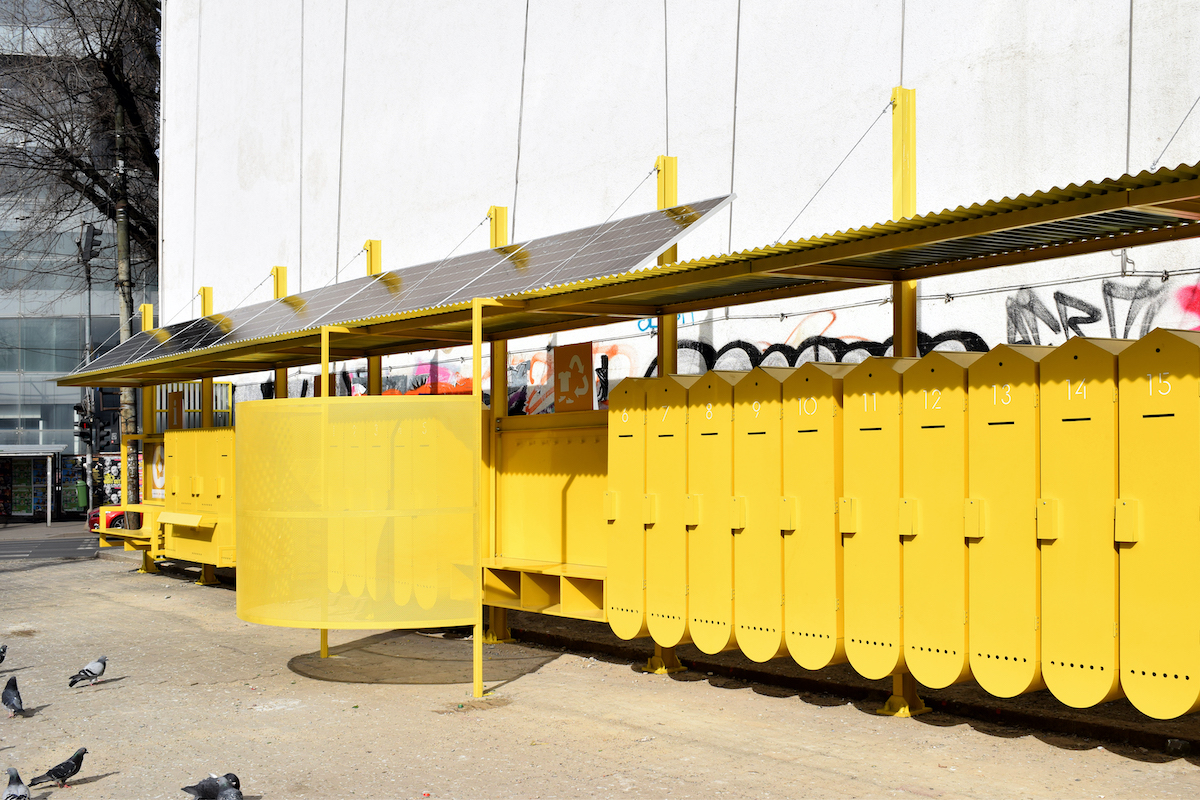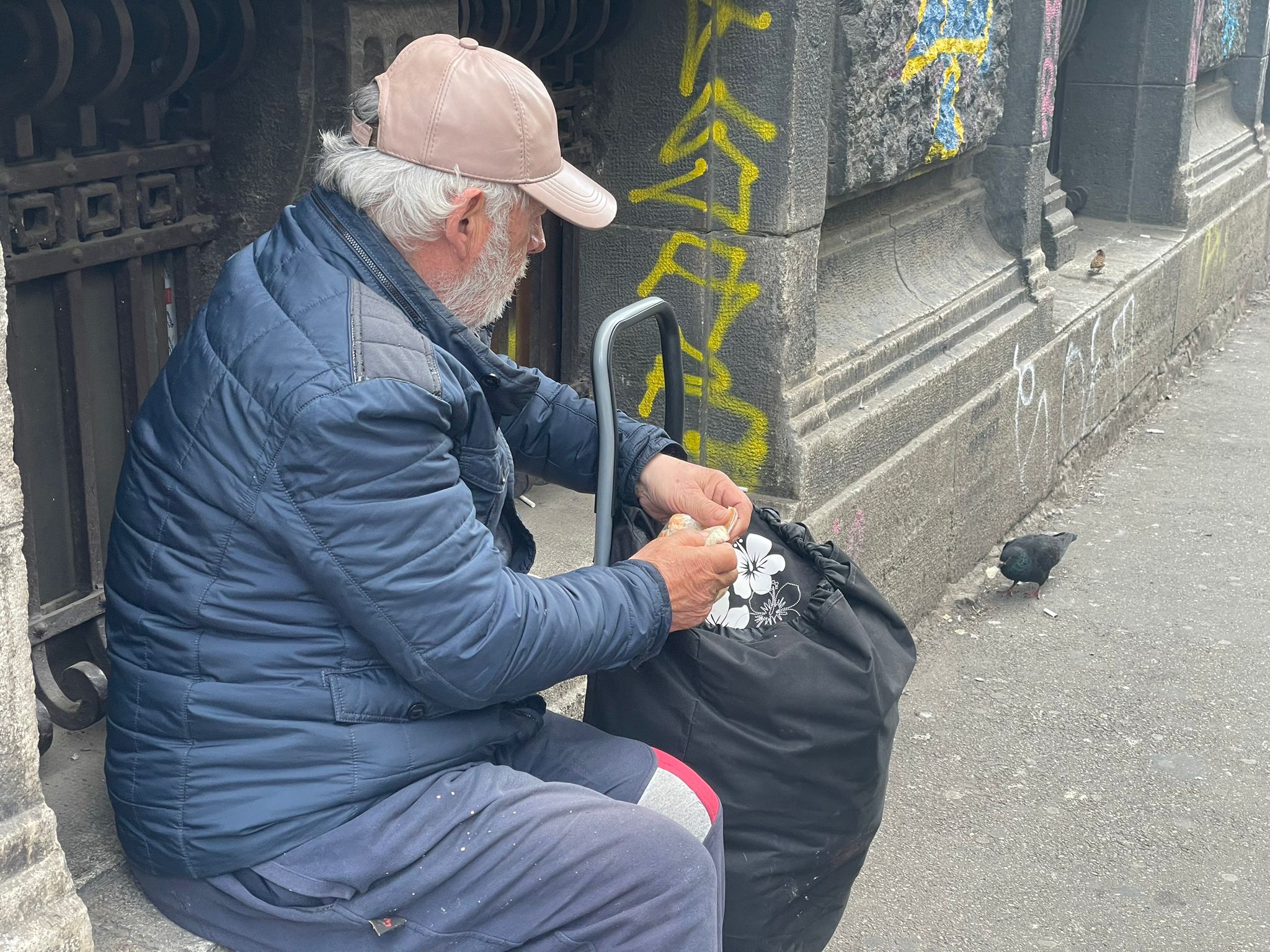
A gentleman with a black suitcase feeds a pigeon in front of the Faculty of Mathematics in Bucharest. He has gray hair, a cap is worn over it, and his pants are tucked into socks. – Negro! “Come on, Black,” he shouted, throwing breadcrumbs at the bird. Stefan, or Mr. Stephen as everyone knows him, is 66 years old and has been homeless for six years.
“God never left me without food,” he says. Neither he nor the pigeons. In his suitcase is a bottle of pineapple-flavored Fuze tea, a few slices of bread, a blanket, and a jacket. We are waiting for what will fall today.
A few minutes later, a guy with a dirty jacket and disheveled hair approaches him and leaves him a bottle of Neumarkt. He begged and obtained two, one for himself, one for Mr. Stephen. This is the same guy who defended him after he was attacked by other homeless people one night. He slept in front of the Academy bookstore and woke up with a cut strip and a missing phone.
He is most afraid of losing his report card or license, which he always keeps in the right pocket of his jacket. After 21 years of working in America, a series of failed businesses and a divorce, he is thinking of filing for retirement. So he will be able to get a studio apartment, albeit a small one, but his own.
He quickly drinks what’s left in the tea bottle, then pours beer into it. He takes a sip and puts it back in his suitcase. In this way he avoids the risk of being condemned by people.
The number of homeless people in Romania is difficult to determine because of their internal migration, as well as external migration. Research has been carried out by homeless associations, but the number also varies between 10,000 and 40,000, according to the Labor Minister’s answer to a question from MP Christian Buican in 2019.
Without documents, it is difficult to estimate the number of homeless people
This is one of the big problems faced by the “invisible people of Bucharest”, as Florin Peunescu, coordinator of the Carousel Association’s Hrivica-Cismigiu community center, calls them. Without ID, it is very difficult to know how many people are currently in a situation identical to Mr. Stephen’s. Even if I can use a previous ballot, it often doesn’t help much.
“A preliminary ballot is a piece of paper on which your photo is stuck. It lasts a year. Even if there are shelters, it is clear that they are not for everyone. And then let’s imagine a little: it snows in winter, this piece of paper gets wet and it’s gone immediately,” says Florin Peunescu.
An even bigger problem with this temporary ballot is that it sticks a label. If you go to an employer with this document, you will automatically be labeled as a “homeless person” and you may come across many closed doors, continues the coordinator of the community center Grivitsa-Cismigiu.
Although it may seem from the outside that it is easy to seek help from government centers that say they are doing their job but have no one to talk to, the situation is not as simple as it seems.
- Read also: DW report. “People say that crazy people are happy and do no harm.” What happens to the mentally ill, abandoned on the street
“Actually, the problem of their reluctance is that they face so many obstacles and people’s reactions. Then it’s also okay to reach a point where you’re afraid. Many times it is much more important for them to say ‘Good afternoon!'”, Florin Peunescu explains what he noticed from his experience working with homeless people.
Therefore, a significant part of them chooses to stay on the street, where they build various mechanisms with which they can move on.
This winter was mild for Mr. Stephen, but it is still difficult for him, because “he is no longer 30-40 years old.” For example, he slept near Fântâna Vioara Spartă, through the groves, wherever he could. When the evening comes, he puts it on the luggage and goes to sleep like that. He does not sleep well, always keeps one eye so that someone does not steal his things. Many times the lion woke up wet, and it was harder for him to bear the cold.
Centers aren’t an option because he doesn’t trust the people there. He ended up in the shelter of Theodore Pallas, but not for long.
“They were all corrupt,” he believes. He feels constant fear when it comes to other homeless people or anyone who might take advantage of him and steal his things.
What do you do if you have nowhere to put food?
The idea behind the “Carousel” Association is as follows: I am building a community that can help abandoned people who are in dire need of help. This is not only happening in public centers, it is also happening on the streets of Bucharest.
Mr. Stephen was right in not going a day without food. After about half an hour of standing at the same place, a woman appears with a Lidl bag in her hand. “I was thinking, what am I supposed to do if I come here and can’t find you?! I put you a pole with fish, I will also give you money. Maybe you can have something to eat, not just…beer,” the woman tells him, handing him three lei.
Mr. Stephen replies “Oh my god!” and the woman takes him from her place. He has food for two or three days. He felt that he would get food, but now he does not know where to hide it. “So that they don’t take away my pole and fish!”.
The lack of storage space leads to many sleepless nights and the constant fear of losing what little they have. Currently, there is no place in Bucharest where the homeless can leave their belongings, but such a point is planned to be opened.
“There are a few cupboards to open. This is a pilot project, we believe that everything will turn out well and there will be more such spaces. In fact, we are talking about some dead spaces in Bucharest where nothing happens,” Florin Peunescu explains.
Thanks to the “Solidarity Perimeter” project, 20 people from Bucharest will be able to safely leave their belongings. This means 20 lockers will be put into operation this spring, reports Șiriong.ro.

Cabinets for outdoor. PHOTO: special seminar
Among their main problems are loneliness, depression and fear
Mr. Stephen takes off his cap and takes out a cigarette. He had two. He keeps them there because it’s easier not to break them. He has had heart problems and depression since he got out. The divorce hurt him, it’s true, but he resents feeling abandoned by his girls more.
“I prayed, I worked and did not choose anything. I am a man of the flesh as long as my heart endures?”
Florin Peunescu says that many people who cross their threshold seek help in this sense. La Carusel also offers them psychological counseling. As for the “Hryvitz” Community Center, a psychologist has been working here for two months, holding meetings with people:
“It’s very important how we deal with this whole story. We want to create as friendly an environment as possible where people feel welcome and included. That’s what respect is all about. After all, as I already said, people are marginalized. We want to restore their dignity.”
Samus Social is another NGO from Bucharest that offers psychological counseling to homeless people in the outskirts of the capital.
What does the state do?
In December 2022, the Government approved the National Strategy for Social Involvement of Homeless Citizens for 2022-2027 and the Action Plan for the same period.
The documents were developed as part of the project “Every person is important! Assessing the needs of homeless people and the impact of existing social services on their quality of life.” It was conducted during 2019-2021 and consisted of surveying 1,220 homeless people, of which 788 are recipients of social services in the mode of residence and 432 live on the street or in other public places, according to a press release published by the Ministry of Labor.
This study found that there are more homeless men (76.8%) than women (23.2%). The average age of people in this situation is 50 years old, most of them are single, with an average level of education and have been in this situation for more than three years or have faced something similar in the past.
The national strategy aims to increase the level of social integration of homeless people and does so through four specific objectives:
- Prevention of accentuation of the phenomenon at the national level;
- Provision of adequate, multidisciplinary and comprehensive intervention for the social integration of these people;
- Prevention of relapses after intervention;
- Improving the coordination of national/local policies regarding the target group;

Mr. Stephen and Black. PHOTO: HotNews.ro/ Andra Muresan
When was the last time you wanted nail polish?
Although the state has strategies it is implementing, for Mr. Stephen the community is more important. That’s because she’s the one who manages to trigger a mechanism he’s perfected over the years of being homeless that helps him move on.
Three nuns from a monastery she did not know came to bring her a package: two casseroles with vegetable soup, a croissant with chocolate, red sauce, tomatoes, chopsticks and sardines, as well as a casserole with ready-made food.
“Mother, may God grant them all faith! Oh God!” says Mr. Steven and crosses himself. When the women left, he wondered what he would do with so much food. “And I will give it to others,” is the conclusion. Now it remains only to wonder: where will he spend the night?
He turns his gaze to the sidewalk and sees the Negro. She starts calling him and calls him to give her food. He breaks away from the slices of bread that lie in his suitcase. So he fed three pigeons, two more appeared after Negruts. “There are two pigeons without breast that come and eat from my palm,” he says, “the doves are the holy spirit.”
Towards the end of the day, he gets up and goes to the police station, where he decides to sleep for the day. No one approaches him there. He hangs around the university area until dark and then heads there. He stands up and loses his balance a little. He walks stiffly and slowly, barely lifting his feet from the ground. Yesterday he lost his stick. He left it in Moshilor, on the bench.
The day before, he slept with his family. They are part of the people who run the engine. When he changes the bed, he takes them by car. That’s because someone helped him get his driver’s license back. He takes a shower twice a week in the apartment of someone who saw him on the street. People bring him food. And yet he feels lonely.
“Loneliness is the twin sister of death. It affects you mentally. I would like to talk to someone about football, news. But I need a bigger file now so I can cut my nails too.”
- Read also: If you want a ramp – build it!”. What is the life of a disabled student in a country that is not yet ready to respect him
Source: Hot News
Ashley Bailey is a talented author and journalist known for her writing on trending topics. Currently working at 247 news reel, she brings readers fresh perspectives on current issues. With her well-researched and thought-provoking articles, she captures the zeitgeist and stays ahead of the latest trends. Ashley’s writing is a must-read for anyone interested in staying up-to-date with the latest developments.